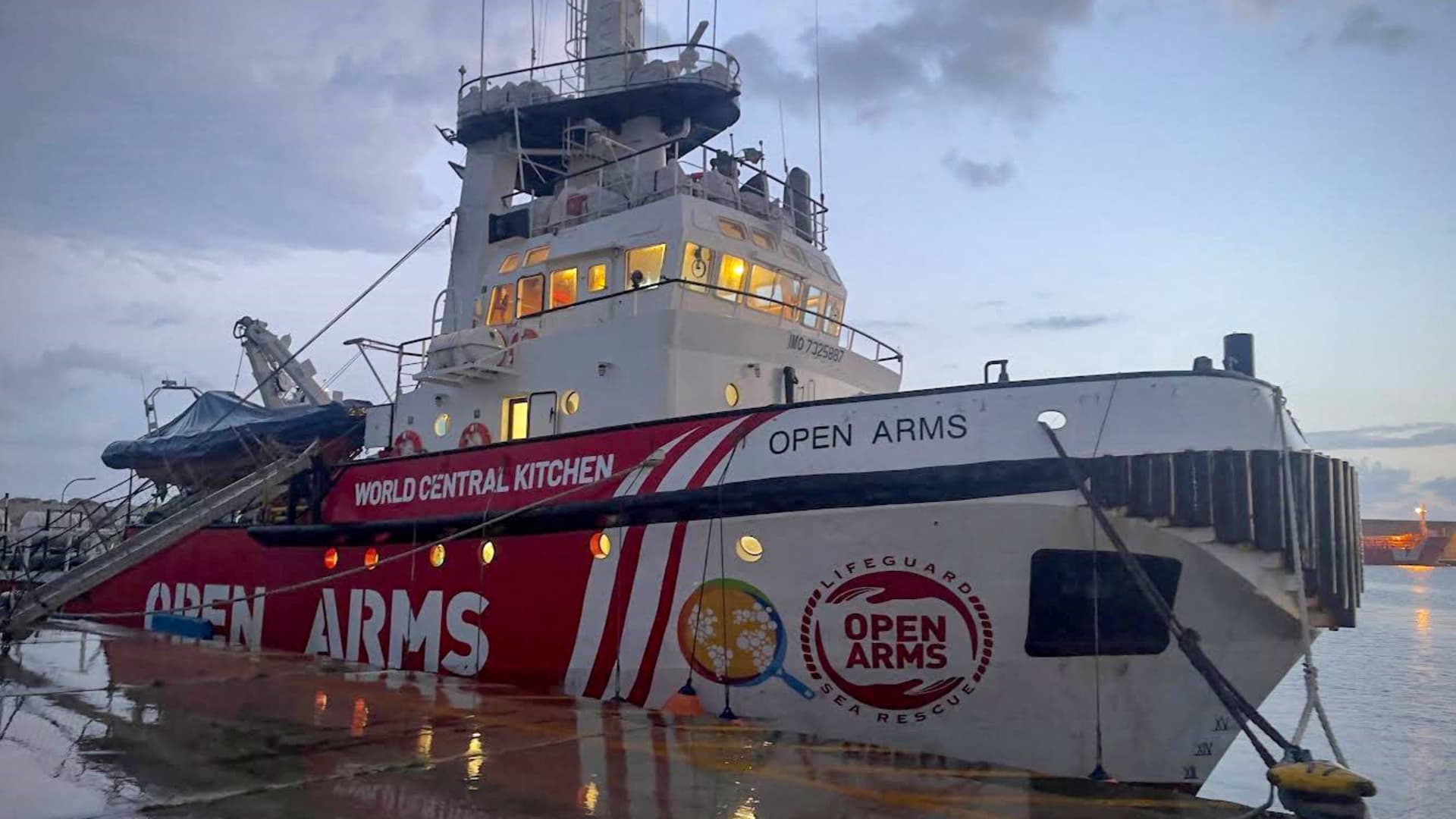First ship carrying aid approaches Gaza Strip as Israel accused of stalling supplies
A charity ship full of food and supplies is expected to arrive in Gaza on Friday, amid warnings that thousands in the enclave are on the brink of famine.

The Open Arms vessel docked in the Cypriot port of Larnaca.
- | Afp | Getty Images
An aid ship was approaching the Gaza Strip's coastline on Friday with much-needed deliveries for the Palestinian people, as relief organizations warn that thousands in the besieged enclave are on the brink of famine.
The ship — called Open Arms and run by a Spanish charity of the same name — carries around 200 metric tons of supplies including flour, rice and water, from Larnaca port in Cyprus. Video footage from the AFP news agency showed the ship visible off the shore of the Gaza Strip on Friday morning London time.
The circuitous route comes as numerous trucks of food and aid await permission to enter the Gaza Strip via either the Kerem Shalom crossing, which borders Israel and Gaza, or the Rafah crossing, which borders Egypt and Gaza.
Israel last year agreed to work with Cyprus in setting up an aid corridor across the sea between the European Union member and the Gaza Strip. Earlier this month, the Israeli Foreign Ministry said it welcomed the finalization of the initiative, which it said "will allow the increase of humanitarian aid to the Gaza Strip, after security checks are carried out in accordance with Israeli standards."
Juliette Touma, director of communications at the United Nations Relief and Works Agency for Palestine Refugees (UNRWA), said the lack of humanitarian access had made the situation in northern Gaza significantly worse.
"This is where starvation has been identified. We could have prevented that situation, it's a man-made situation," she told CNBC.
Citizens queue for food that is cooked in large pots and distributed for free during war-time on December 28, 2023 in Rafah, Gaza.
Ahmad Hasaballah | Getty Images
"The fact that parts of northern Gaza [are] on the verge of famine, could have been prevented, if more humanitarian supplies including and especially food, were allowed to travel to the North on a regular basis."
The Palestinian Health Ministry in Gaza said that, as of March 12, 27 people had died of malnutrition and dehydration in hospitals in the north of the enclave, of which 23 were children.
There has been a 50% drop in aid trucks to the Gaza Strip in February compared to the previous month, according to Nebal Farsakh, spokesperson for the Palestine Red Crescent Society.
"If there was one item the Israeli authorities think should not enter, they will stop the whole truck and send it back without telling us the item that was denied access," Farsakh told CNBC from the West Bank.
Israeli authorities inspect all aid convoys that enter Rafah crossing and the process is lengthy, Farsakh said. "Thousands of trucks are still waiting at Rafah crossing, but they need to be approved by the Israeli authorities."
Trucks carrying humanitarian aid and food supplies at the Kerem Shalom Crossing on the Israel-Gaza border.
Bloomberg | Bloomberg | Getty Images
A spokesperson for the Israel Defense Forces said it continues to expand its efforts to enable the entry of humanitarian aid into the Gaza Strip. "The IDF takes great effort to facilitate the entrance of humanitarian aid and acts to enable the entrance of such in a safe and coordinated manner," the spokesperson told CNBC.
"A ship carrying humanitarian aid from the WCK (World Central Kitchen) organization and funded by the United Arab Emirates set sail on Tuesday from the port of Larnaca in Cyprus toward the Gaza Strip. This was carried out in coordination with Israeli security and civilian authorities, in accordance with the directive of the government of Israel and at the request of the U.S. government," the spokesperson added.
On social media site X, the IDF has also accused Hamas of diverting aid, which the Palestinian militant group denies.
Blocking aid
Several humanitarian and non-governmental organizations have accused Israel of deliberately targeting aid convoys and workers at the Rafah crossing.
"On three different occasions, our convoys have been hit either on the way in or out of the North. And in the three different incidents, it was the Israeli army that was responsible. So getting to the North is extremely difficult," the UNRWA's Touma said.
An Israeli soldier stands by an Egyptian truck carrying humanitarian aid at the Israeli side of the Kerem Shalom border crossing with the southern Gaza Strip on January 22, 2024, amid the ongoing conflict between Israel and the Palestinian militant group Hamas.
Menahem Kahana | AFP | Getty Images
Philippe Lazzarini, commissioner-general of UNRWA, said this week on X that a truck loaded with aid "has just been turned back because it had scissors used in children's medical kits."
The Israeli army says that scissors are "dual-use" and are deployed by Hamas as weapons.
Earlier this month, Refugees International released a report that alleges that Israel is obstructing the entry of life-saving supplies into the Gaza Strip.
Jesse Marks from the U.S.-based humanitarian organization told CNBC that, while their report is detailed, "it reinforces what most humanitarian and UN actors know on the ground, that Israeli conduct is consistently impeding aid organizations in Gaza and has blocked legitimate aid efforts from moving forward."
Global aid campaigns
Israel's siege of the Gaza Strip followed a terror attack by Hamas on Oct. 7 in southern Israel that killed approximately 1,200 people and saw more than 240 taken hostage.
The subsequent bombardment of the enclave by Israel, and lack of aid to the area, have resulted in growing calls of a worsening humanitarian crisis. It has led countries and organizations from around the world to step up efforts to get food into the Gaza Strip via both air and sea.
The United States and Jordan have conducted humanitarian airdrops, although these have been criticized by aid groups which called them "inefficient" because of Israel's land blockade.
In this picture taken from Israel's southern border with the Gaza Strip shows a military aircraft dropping humanitarian aid over the Palestinian territory on March 12, 2024, amid the ongoing conflict between Israel and the militant group Hamas.
Menahem Kahana | AFP | Getty Images
Morocco also sent 40 metric tons of humanitarian supplies via Israel's Ben Gurion airport in the latest effort to find new aid routes into the Strip.
Meanwhile, on Tuesday, the UN World Food Programme used a new land route to deliver six trucks of food directly into northern Gaza for the first time since Feb. 20.
The Open Arms charity, which is collaborating with chef José Andrés' World Central Kitchen organization, said it was working to establish a "vital entry route" into the Gaza Strip for food and necessities.
"Although this mission is highly complex, it is undeniably necessary. Our vessel, the Open Arms, is equipped with tons of food and water, and our dedicated crew is ready to assist the most vulnerable," the charity said in a release.
WASHINGTON, DC - MARCH 14: Celebrity chef Jose Andres (C) joins Sen. Chris Coons (D-DE) (L) and Sen. Peter Welch (D-VT) for an interview following a meeting about getting humanitarian aid to Gaza at the U.S. Capitol on March 14, 2024 in Washington, DC. The founder of the World Central Kitchen, Andres is working with the United States and Israel for weeks to make a plan to deliver maritime shipments of aid to Gaza.
Chip Somodevilla | Getty Images
The UNRWA's Touma said while these international efforts were welcome, "there are efficient, easier, cheaper, safer, and reliable ways to get aid to the people of Gaza. And that is via the road through increasing the number of trucks that the Israeli authorities allowed to travel into Gaza by road."
While delivering aid overland remains a challenge, the United States has announced that a temporary pier will be built off the coast of Gaza.
U.S. Secretary of State Antony Blinken said that, when construction is completed, the pier "will enable the distribution of up to 2 million meals every day, as well as medicine, water."
However, he stressed that this is not a substitute for land delivery and that, "Israel needs to open as many access points as possible and keep them open."

 MikeTyes
MikeTyes 






























